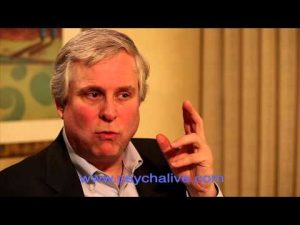VIDEO: Dr. Kirk Schneider – The Transformative Power of Awe
Watch an excerpt from PsychAlive’s exclusive interview with Dr. Kirk Schneider.
Dr. Kirk Schneider talks about how awe and how it can transform people.
LF: I was really struck when I was at that conference with you and people were saying their experiences of awe, how many of them touched on death or painful issues, not, you know, awe, like it was just so fun, but awe that had a lot of meaning, seemed to be tied up with the death issue for a lot of people.
KS: I think it’s very true. It’s because the sense of awe, it’s a very powerful sensibility. At least for me, it’s about both realizing my sense of smallness and fragility in this life and the, the overwhelming, or the significance of the specter of death on the background, and the groundless in the background. But at the same time, being able to stay present with that to the point where I was able to come into a realization that I’m a part of all of this, too.
I’m not just separate from it, but I’m participating in it and if I can stay with the process, I come into the more of who I am and what life is about. And in coming, you know, into the more of who I am, I recognize or I’m in touch with the fuller ranges of my experiences, from my deepest dreads to my most dazzling desires and fascinations. And I think a lot of people kind of relate to that. Awe usually comes from a foundation shaking experience of some kind.
LF: Yeah. And it seems really tied up with resilience, too, you know, to coming out that other side of it by having been touched by something that was really, took away a sense of security.
KS: Absolutely. And again, it’s that critical point between the possibility to come into the more of one’s own being, or the alternative of either total collapse or some tremendous defense against the unknown, the unpredictable. And I think one of the main differences between the two is that if people are able to come into the awesomeness of the experience more, there’s usually somebody there who has helped them. It’s what Alice Miller calls a “helpful witness.” In my case, it was my analyst to a large extent, although my parents were certainly a part of that, too, as they were able. But that intervention is so huge and that’s one of the things I like about your work, as well, is that you are studying those critical points of intervention.
LF: I also thought about it in relation to our returning soldiers who, you know, are a high risk population and have often experienced a lot of, a huge amount of stressful experiences and often very shattering ones.
KS: Yeah. I think, you know, the challenges in those situations are almost overwhelming, in many cases. So the degree of intervention needed is of equal intensity, I believe for many.
LF: Right, but that person joining with them potentially as a therapist and them feeling connected could make a huge difference.
KS: … very huge difference. I’ve had clients in similar situations and I believe that the sharing of our own wounding has been an important part of that work and our own process in dealing with that.
Tags: defenses, depression, self-esteem, stress, video








Leave a Reply